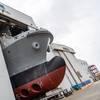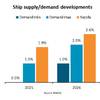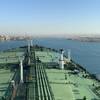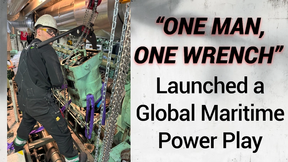Great Ships of 2001 -- Skandi Carla
She is considered equally well suited to the harsh environment of the North Sea as to the so-called Golden Triangle development areas of West Africa, Brazil and the Gulf of Mexico, where operations in extreme water depths are the norm. ROV-based work can be carried out by the new vessel at depths as great as 3,000 m.
Built to a design developed by the Norwegian consultancy Marin Teknikk (MT), the versatile Skandi Carla has integrated, protected moonpool for ROV operations, just forward of midships, complemented by an open deck area of 640-sq. m. The deck has been strengthened for a 5-t/sq. m. loading, with a total carrying capacity of 2,000-tons, and is plumbed by a 50-ton, heave-compensated Hydramarine crane stooled on the starboard side.
The main, work-class ROV is dispatched and retrieved through the moonpool using a custom-designed launch and recovery system (LARS). A moveable mezzanine deck arranged in the after part of the ship provides a platform that can be used for a second ROV - or for trenching equipment. The arrangements permit two ROVs to be deployed simultaneously, with the second unit put overboard to starboard by way of the Hydramarine crane. Facilities are in place on deck to support clients' trenching, pipeline and cable deployment spreads.
Scope for undertaking unbroken, longer work assignments is enhanced by the foreship helideck, strengthened to receive a Super Puma-type aircraft, and enabling personnel to be changed out at sea. In terms of bunker capacity relative to the fuel consumption profile, the ship has an endurance of around 40 days.
Characteristic of such vessels, Skandi Carla has a large accommodation capacity for up to 80 persons in single-berth and two-berth cabins, so that charterers' own technical specialists can be carried in addition to the vessel's regular complement. Her power and propulsion plant is based on four eight-cylinder engines of the Caterpillar 3600-series, a popular marquee among Norwegian operators yield. The 'Big Cats' serve as the prime movers in the 2,475-kV main gensets.
Diesel-electric has become the mode of choice for many Norwegian supply and support vessel owners in the latest period of fleet investment, through the recognition of benefits with regard to overall operating performance in terms of flexibility and full-cycle economy. The location of the diesel-alternator aggregates only about one-third aft in Skandi Carla is also indicative of the increased ship design and layout possibilities conferred by a diesel-electric system. Furthermore, its adoption denotes a perception of environmental benefits, in terms not only of reduced exhaust emissions but also as concerns onboard noise and vibration levels. In fact, the vessel's environmental attributes as a whole have been recognized in the award of the Clean class notation by Det Norske Veritas.
The propulsion, maneuvering and station-keeping devices which form the main electrical energy consumers are the two 2,200-kW main thrusters, of contra-rotating azimuth type, plus two 1,000-kW bow tunnel thrusters and adjacent, retractable unit of 1,000-kW. ABB had total responsibility for the ship's electrotechnical systems, engineering and installation.
A Simrad SDP21 system from Kongsberg ensures the precise dynamic positioning critical to the safe and efficient performance of subsea assignments, as well for operations alongside structures. The nature of the outfit is such that it meets the Norwegian Maritime Directorate's Class II requirements for DP. The propulsion arrangements give a free-running speed of 14 knots.
Aukra undertook the District Offshore build project on the basis of a delivery time of less than 10 months, demonstrating the depth of individual capability within the Aker Yards group. Production scheduling and work quality, key competitive factors in Aukra's target markets, benefit considerably from the full weather protection afforded by the yard's facilities near Molde. Skandi Carla has been taken under the wing of DOF Management, which was already familiar with the Aker build philosophy and delivery performance as a result of earlier projects at the group's other Norwegian yards, namely Aker Brattvaag, Langsten Slip and Soviknes Verft.













